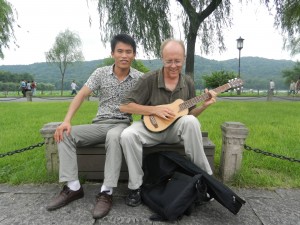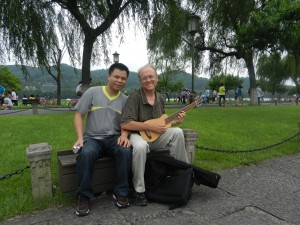If you play any portable musical instrument, for God’s sake, carry it as meticulously as your passport if you travel in China.
Strangers often sat with me to listen. This guy and a friend stopped and asked to be photographed with me while I was noise-polluting Hangzhou. But I found that people in China listen in ways that reflect their ancient cultural wealth. My playing style and their expectations about music differ, and we had some great intercultural meetings.
My playing is American. I often think of a statement by Jimi Hendrix that what goes on “between the notes” matters the most. It’s still crucial to know the notes. A rock guitar teacher wrote that you have to learn the rules before you break them. But I play in between–I usually obey the rules, but then I add jazz chords and different notes than what’s in the current scale. Most of the best classic rock, jazz and blues musicians take this approach–expressing your individual feelings and personality is what music is about. But the people I met in China listen with different concepts of music.
My personal expressions were sounding over the waters in the above shot. This is Hangzhou’s West Lake, which was the capital of the majestic Northern Song Dynasty. Its history and natural landscape encourage different thought patterns.
While playing in a small park in Zhengzhou (a city with a history that goes back even farther–to the Shang Dynasty), a teenage girl sat by me and listened through 6 or 7 songs. She said, “It’s different. Does your guitar play scales?” I plucked some to show her that it does. I found that Chinese listen more for what’s collective and established–they don’t have as many traditions of expressing what’s individual and beyond convention as Americans do.
They also don’t appreciate improvisation as often as many folks in the States do. Jamming is a key part of rock, jazz and blues, but people I met all over China listen more to songs that are well-known. This gives them a common field of experiences to share with their friends in this country where people are rarely alone. Love songs are popular because these family-centered people can relate them to their own experiences and share them with each other.
But things are changing in China. Almost everyone seemed to enjoy my music. My playing isn’t out there–I keep it close enough to conventions to elicit warm feelings. I’ve never related to players who are strictly experimental. There’s enough in it to please people who listen for what’s already familiar.
So lots of young people praised me for my own songs and my solos over well-known tunes. Many young people in China’s cities are curious about the rest of the world, and my audiences liked to hear music from another continent–but while keeping one ear aimed at their own traditions. My playing was new enough for them to be interesting, but familiar enough to be enjoyed. So lots of youths asked me for a guitar lesson.
But I had different experiences with older people, as you’ll read in the next post, Chinese Ears, Part Two.




Comments on this entry are closed.